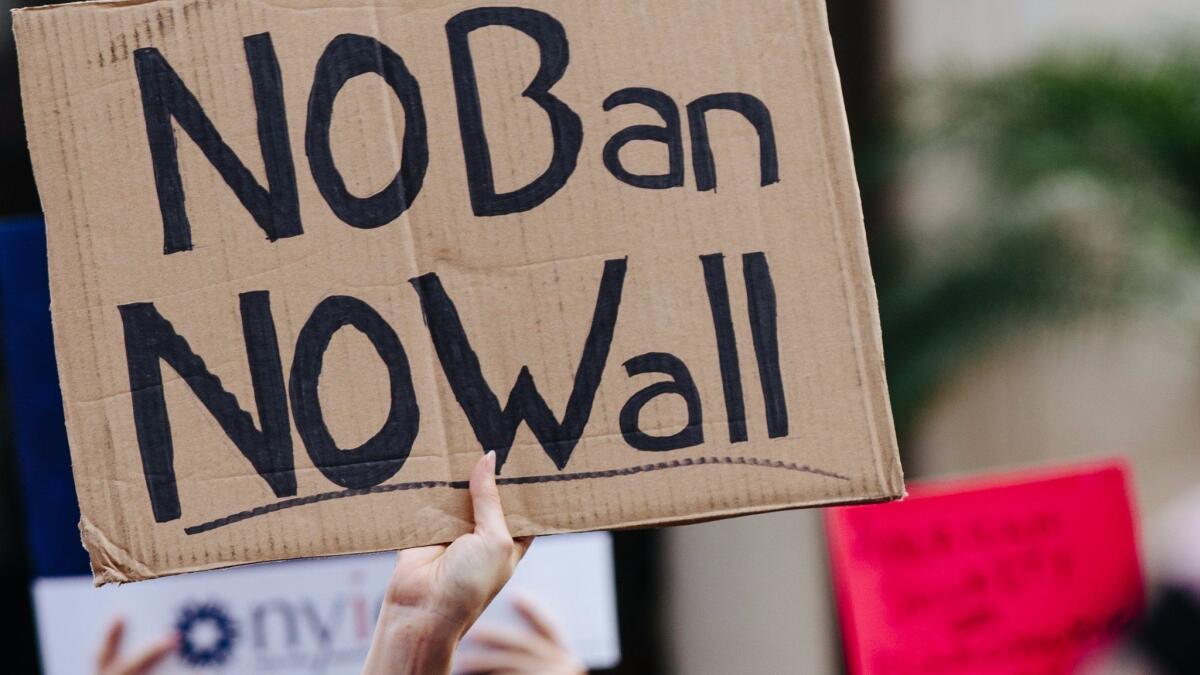‘What universe does that come from?’ Judges criticize travel ban weeks before it heads to Supreme Court

- Share via
A panel of U.S. 9th Circuit Court of Appeals judges heard arguments Monday in Seattle over how broadly President Trump’s travel ban can be enforced, and seemed inclined to uphold exemptions that let U.S. residents’ relatives continue to arrive from banned countries.
The judges, Michael Hawkins, Ronald Gould and Richard Paez, who will issue their opinion later, will not decide whether the ban is legal. That question, one the same judges considered this year in a decision that suspended the ban, is left to the U.S. Supreme Court to take on when it hears arguments over the issue in about six weeks.
Instead, the judges are looking at who falls under the ban. They prodded lawyers from the Trump administration and the state of Hawaii, which has sued, about how immigration law applies to Supreme Court orders on who is exempt from it.
Trump originally signed the ban in January before it was blocked in federal courts. It was then modified and struck down again before the Supreme Court resurrected a limited version of it.
The ban, which went into effect on June 29, prevents travel to the U.S. by nationals of Somalia, Syria, Sudan, Yemen, Libya and Iran for 90 days. Separately, it stops all refugee resettlement for 120 days. But the Supreme Court said that it can’t apply to anyone who has a “bona fide” relationship to a person or entity in the U.S.
Deputy Assistant Atty. Gen. Hashim Mooppan argued that the court should strengthen the ban by removing exemptions for people with specific relatives, such as grandparents, in the U.S. Currently, banned nationals can still travel if they have a grandparent in the U.S.
Gould, who like the other judges is a President Clinton appointee, seemed skeptical of the idea.
“How can the government take the position that a grandmother or a grandfather, or aunt or uncle, of a child in the U.S. does not have a close familial relationship? Like, what universe does that come from?” he asked.
Paez also seemed to not buy what opponents have derided as the “grandma ban.” He asked why the government accepted in-law parents as legitimate U.S. connections but not grandparents.
“Could you explain to me what’s significantly different between a grandparent and a mother-in-law, father-in-law?” Paez asked. “What is so different about those two categories? One is in and one is out.”
But the judges were less critical of the refugee ban, which has blocked most refugees from resettling in the country since the it went into place this summer. Refugees who have family members in the U.S. can resettle. They include about 900 who were allowed in since July.
But travel ban opponents say the ban still blocks 24,000 refugees who have been given formal assurance that the U.S. government would allow them to resettle under a 110,000-person refugee cap that President Obama put in place before he left office. Trump’s ban slashed that number by more than half to 50,000. The cap runs through the fiscal year that ends in September.
Mooppan said in court that such formal assurances did not count as “bona fide” connections of refugees to the U.S. or to a resettlement agency.
“The refugee assurance does not create any relationship between the resettlement agency and the refugee. It’s a relationship between the resettlement agency and the government,” which contracts out to the agencies to help immigrants settle in the U.S., Mooppan said.
In less than an hour of arguments, the judges also questioned Colleen Roh Sinzdak, an attorney from the law firm Hogan Lovells who represented the state of Hawaii. At one point, Sinzdak attempted to point out to the panel that courts had previously found the travel ban to be illegal, but Hawkins cut her off.
“We’re not here on the merits,” he said. “We’re trying to shape a remedy that will satisfy the United States Supreme Court so when they hear the case in a couple of months on the merits, they can make an appropriate decision.”
Aside from a handful of examples — such as people who have university admission and employment offers in the U.S. and those residing in the U.S. who have mother-in-laws abroad — the Supreme Court in June did not define what counts as a bona fide U.S. connection. The lack of clarity has led to a series of lawsuits.
After the Supreme Court decision, the Trump administration issued guidelines saying that family connections included only people with a parent, spouse, child, adult son or daughter, son-in-law, daughter-in-law, sibling, fiance or fiancee, or a parent-in-law in the U.S.
And while thousands of refugees had been approved for resettlement, the administration said a relationship to a resettlement agency by itself did not constitute a bona fide U.S. connection for those immigrants.
Then last month, a federal district judge in Hawaii ruled that exceptions had to be made for grandparents, grandchildren, aunts, uncles, nieces, nephews, cousins and brothers- and sisters-in-law. The judge, Derrick K. Watson, also disagreed with the Trump administration about refugees. He ordered that refugee agencies could count as bona fide connections and cleared the way for more refugee travel.
The Trump administration appealed the decision to the Supreme Court, which placed a hold on the judge’s ruling on refugees until the 9th Circuit could consider the case. In the meantime, lawyers have started filing briefs on the travel ban’s constitutionality to the Supreme Court. Oral arguments are scheduled for Oct. 10.
Jaweed Kaleem is The Times’ national race and justice correspondent. Follow him on Twitter, Facebook and Instagram.
More to Read
Sign up for Essential California
The most important California stories and recommendations in your inbox every morning.
You may occasionally receive promotional content from the Los Angeles Times.











